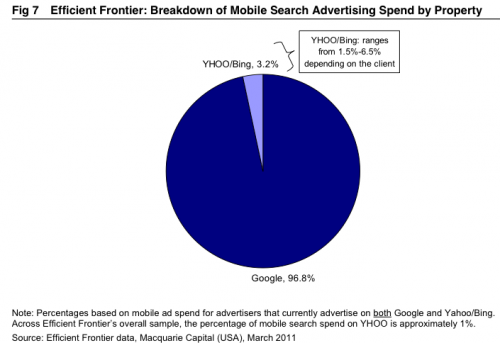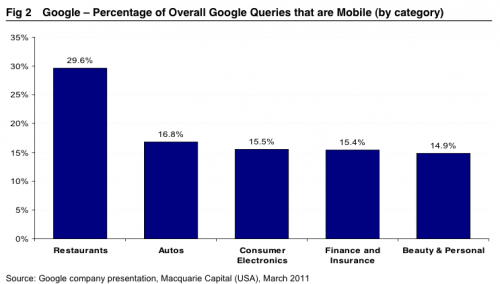Google Controls 97 Percent Of Mobile Paid Search: Report
Almost 5 percent of paid search spending in the US is now in mobile, according to a report released last week from banking and investment firm Macquarie Group, using Efficient Frontier data. That mobile search spend could double to almost 10 percent by the end of this year if growth continues at an aggressive pace. […]
Almost 5 percent of paid search spending in the US is now in mobile, according to a report released last week from banking and investment firm Macquarie Group, using Efficient Frontier data. That mobile search spend could double to almost 10 percent by the end of this year if growth continues at an aggressive pace.
Using some very rough math that would mean US mobile paid search could be worth approximately $1.1 billion (at least) by the end of 2011. And almost all that money would be Google’s.

Just as Google dominates mobile search share in the US (with roughly 98 percent), the report said that 97 percent of mobile search spend (for Efficient Frontier clients) now goes to Google, while 3.2 percent spend goes to Bing/Yahoo.
At the recent IAB event in Florida Google CEO Eric Schmidt said that mobile is growing “faster than expected” and surpassing all the company’s internal projections. On average mobile search queries represent roughly 15 percent of all search volume across categories, according to Google.
But there’s a catch. Efficient Frontier data show higher CPCs and lower CTRs for mobile search campaigns. This pattern is confirmed by iCrossing data as well.
The report states that mobile searches have a CTR that is “30 percent lower than desktop” CTR. By the same token mobile search CPC is 13 percent higher than on the PC, according to Efficient Frontier’s data. The report doesn’t mention click to call or its impact on CPC prices.
What these data argue is the need for different ROI metrics for mobile search campaigns. Marketers need to “open the aperture” and take a greater range of actions and activity into account:
Currently, ROI measurement for mobile search advertising is largely based on the same revenue-based ROI criteria used to evaluate desktop search campaigns. As a result, the ROI statistics for mobile campaigns are often significantly lower than for desktop search campaigns (as evidenced in Efficient Frontier’s data). Until advertisers can more accurately attribute a wider range of “success” events such as offline store visits, offline and (delayed) online sales, and phone calls to a mobile ad campaign, marketers using a traditional ROI-based approach to make campaign budget decisions will be less willing to increase mobile ad budgets.
Clicks and CTR are bad metrics for mobile. For example, InsightExpress and Dynamic Logic data show mobile display ads consistently outperforming PC display across a range of non-CTR brand metrics (e.g., recall, favorability).
Many mobile users are inclined to take immediate, “real-world” action and are more likely to do so than their PC counterparts. According to Google’s Surojit Chatterjee, “Mobile users are more prone to take immediate action. People searching on mobile have a higher intent. The time between intent and action has been narrowed.”
The report also has this interesting analysis about the impact of the iPhone on Google’s fortunes in mobile — 50 percent of iPhone Google searches come from the toolbar:
We’ve seen data that shows that while Google absolutely dominates searches emanating from the iPhone (95%+), ~50% of iPhone Google searches come from the toolbar, 42% from Google’s homepage and less than 10% from Google’s app. This is an absolutely critical point, as it indicates that Apple has significant influence over GOOG’s mobile search share. If Apple were to make Bing the default search provider through its toolbar, Google’s share could be significantly impacted.
In other words, if Bing were to capture the default toolbar position on the iPhone it would potentially mean 50 percent of search queries would be diverted away from Google. Android is obviously a massive hedge against that possibility.
Contributing authors are invited to create content for Search Engine Land and are chosen for their expertise and contribution to the search community. Our contributors work under the oversight of the editorial staff and contributions are checked for quality and relevance to our readers. The opinions they express are their own.
Related stories

